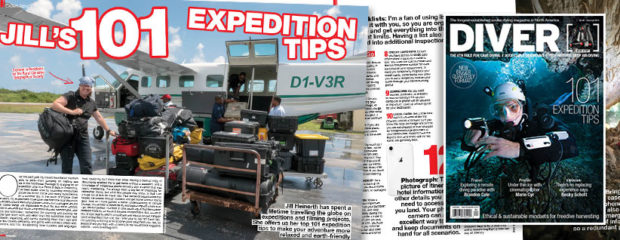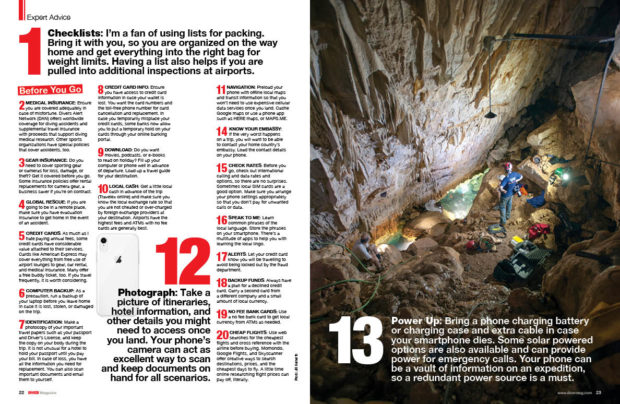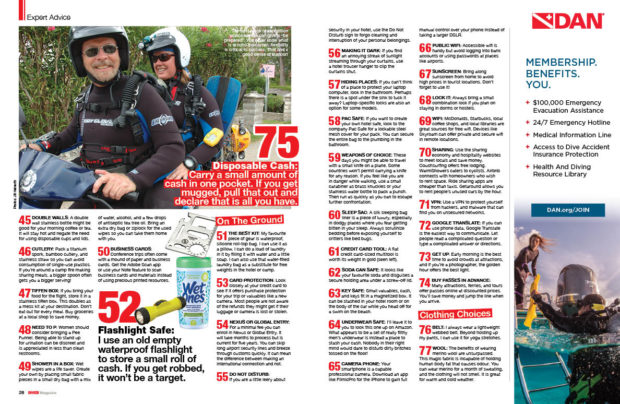
Jill Heinerth has spent a lifetime travelling the globe on expeditions and filming projects. In the Summer issue of DIVER she offers us her top 101 expedition tips to make your adventure more relaxed and earth-friendly. Here are a few of our favourites…
Checklists: I’m a fan of using lists for packing. Bring it with you, so you are organized on the way home and get everything into the right bag for weight limits. Having a list also helps if you are pulled into additional inspections at airports.
Global Rescue: If you are going to be in a remote place, make sure you have evacuation insurance to get home in the event of an accident.
Photograph: Take a picture of itineraries, hotel information, and other details you might need to access once you land. Your phone’s camera can act as excellent way to scan and keep documents on hand for all scenarios.
Power Up: Bring a phone charging battery or charging case and extra cable in case your smartphone dies. Some solar powered options are also available and can provide power for emergency calls. Your phone can be a vault of information on an expedition,
so a redundant power source is a must.
Local Cash: Get a little local cash in advance of the trip (Travelex online) and make sure you know the local exchange rate so that you are not cheated or over-charged by foreign exchange providers at your destination. Airports have the highest fees and ATMs with no fee cards are generally best.

Know Your Embassy: If the very worst happens on a trip, you will want to be able to contact your home country’s embassy. Load the contact details on your phone.
Gifts for Kids: A small token gift can go a long way when you are abroad. A flag pin or interesting sticker is a far better gift than giving children money or candy.
Ziplocks: Ziplock bags are great for packing clothes. Use the soft clothing packs to pad more sensitive or fragile items. If you roll a fragile object in clothing, place it in a bag so it doesn’t get accidentally dropped during luggage inspection. Use heavyweight bags so they can be reused.
First Aid: Pack a small kit with pain reliever, Benedryl, decongestant, antacid, cough drops, bandages, hydrogen peroxide, activated charcoal pills (for diarrhea and minor allergic reactions), and antibiotic cream.
Tissues: Never assume that toilet paper is available or free. Take your own.
Photograph layers: If your bag packing is like an intricate puzzle, consider taking photos as you go, one layer at a time. This will make the re-packing process a little easier and quicker.
Water Bottle: Water bottles are essential, but considering taking a flat hip flask instead. They are easier to pack. Vapur collapsible bottles are even smaller (seen on the left).
Lost Bags: Photograph your luggage prior to departure in case the airline loses your bags. Clearly label them, and use a distinctive marker—this may help them spot a lost bag a little quicker.
Need to P: Women should consider bringing a Pee Funnel. Being able to stand up for urination can be discreet and is appreciated in less than clean restrooms.
Flashlight Safe: I use an old empty waterproof flashlight to store a small roll of cash. If you get robbed, it won’t be a target.
Making it Dark: If you find an annoying streak of sunlight streaming through your curtains, use a hotel trouser hanger to clip the curtains shut.
 Credit Card Tool: A flat credit card-sized multitool is worth its weight in gold (seen left).
Credit Card Tool: A flat credit card-sized multitool is worth its weight in gold (seen left).
Camera Phone: Your smartphone is a capable professional camera. Download an app like FilmicPro for the iPhone to gain full manual control over your phone instead of taking a larger DSLR.
Google Translate: If you can use phone data, Google Translate is the easiest way to communicate. Let people read a complicated question or type a complicated answer or directions.
Wool: The benefits of wearing merino wool are unsurpassed. This magic fabric is incapable of holding human body fat that causes odour. You can wear merino for a month of sweating, and the clothing will not smell. It is great for warm and cold weather.
What’s On Your Body: At all times, you should have your passport, credit cards, and cash on your person. If the plane has an emergency landing you will not be permitted to get anything out of the overhead bin, and you might not get it back for days (this has happened to me).
Inflatable Padding: An inflatable camping pillow serves well as protective padding for sensitive gear and camera parts.
Headlamp: One of the most useful tools is a small headlamp. Whether you are trying not to wake up your roommate in a dark hotel room or searching for parts in the bottom of a dive bag, a headlamp is extremely useful.
To read all of Jill’s 101 expedition tips, purchase the current issue of DIVER now, or subscribe!







